| Srl | Item |
| 1 |
ID:
139721
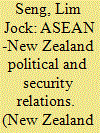

|
|
|
|
|
| Summary/Abstract |
Lim Jock Seng provides a Brunei Darussalam perspective.
|
|
|
|
|
|
|
|
|
|
|
|
|
|
|
|
| 2 |
ID:
103618
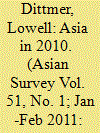

|
|
|
| 3 |
ID:
122972
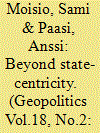

|
|
|
|
|
| Publication |
2013.
|
| Summary/Abstract |
This paper scrutinizes the challenges which scholars face when examining the interconnections between the state and geopolitics in the purported "transnational world". By discussing the relational perspective which "opens" the traditional state-as-a-monolith centric view of geopolitics, the paper sets a foundation for the present special section on the changing geopolitics of state spaces. The paper proceeds by first reflecting on the move from geopolitically "closed" to more open state territories, and then considers some of the ways the state has been examined in spatially sensitive research with respect to geopolitical scholarship. Finally, the paper maps out possible horizons for forthcoming studies on the geopolitics of state spaces.
|
|
|
|
|
|
|
|
|
|
|
|
|
|
|
|
| 4 |
ID:
140376
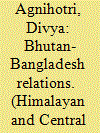

|
|
|
| 5 |
ID:
129205
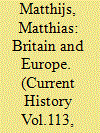

|
|
|
|
|
| Publication |
2014.
|
| Summary/Abstract |
After a tumultuous professional marriage of just over 40 years, Britain and Europe are facing the possibility of divorce. In January 2013, Prime Minister David Cameron decided to celebrate Britain's 40th anniversary as a member of the European Union by pledging a fundamental renegotiation of his country's terms of membership. Cameron further promised to submit any renegotiated deal to a clear "in-or-out" referendum in 2017 on whether or not to leave the EU, assuming his own Conservative Party wins a majority in the next general election in May 2015. Egged on by his party's growing ranks of restive Euroskeptics and trying to fight off a challenge on his right flank from populist Nigel Farage's UK Independence Party (UKIP), Cameron rolled the dice. He hoped to settle once and for all the Europe question, which has so often cast a dark shadow over the political debate in Westminster and Whitehall. Renegotiating
|
|
|
|
|
|
|
|
|
|
|
|
|
|
|
|
| 6 |
ID:
030478
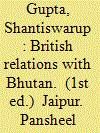

|
|
|
|
|
| Edition |
1st ed.
|
| Publication |
Jaipur, Panchsheel Prakashan, 1974.
|
| Description |
xiii, 223p.hbk
|
|
|
|
|
|
|
|
|
|
|
|
Copies: C:1/I:0,R:0,Q:0
Circulation
| Accession# | Call# | Current Location | Status | Policy | Location |
| 014051 | 954.98/GUP 014051 | Main | On Shelf | General | |
|
|
|
|
| 7 |
ID:
128746


|
|
|
|
|
| Publication |
2014.
|
| Summary/Abstract |
Science can serve as an attractive mode for trust building and cooperative engagement between countries where formal political or diplomatic relations have been strained or are nonexistent. In this article we discuss some conditions and constraints for bilateral academic science engagement and suggest how such engagement might help to build trust between the United States and North Korea. We analyze longitudinal data on North Korea's diplomatic ties and international academic collaboration as well as US public opinion data to provide context for US-North Korea science engagement. We argue that bilateral academic science engagement should be attractive to the United States and North Korea and suggest a set of policy measures that might facilitate such engagement.
|
|
|
|
|
|
|
|
|
|
|
|
|
|
|
|
| 8 |
ID:
151126
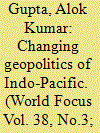

|
|
|
|
|
| Summary/Abstract |
The Year 2017 is of great significance as India and ASEAN would observe 25 years of their Dialogue Partnership, 15 years of Summit Level Partnership and five years of Strategic Partnership.1 India has been envisaging a multi-faceted relationship with ASEAN2 and has always aspired for a full membership of the regional economic group.
|
|
|
|
|
|
|
|
|
|
|
|
|
|
|
|
| 9 |
ID:
125237
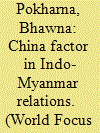

|
|
|
|
|
| Publication |
2013.
|
| Summary/Abstract |
Myanmar has two great and powerful neighbours, India to the Northwest and China to the Northeast. It has Bangladesh to the West, Laos to the East and Thailand to South East. Myanmar's long coastline with good harbors enables it to dominate the Bay of Bengal. Myanmar Shares 2171 kilometres Long border with China whereas with India it shares 1643 kilometres of border. Myanmar lies where South, South East and Asia meet - there the dominant cultures of these sub-regions compete for influence.
|
|
|
|
|
|
|
|
|
|
|
|
|
|
|
|
| 10 |
ID:
103979
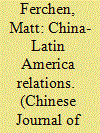

|
|
|
| 11 |
ID:
123658
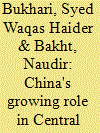

|
|
|
| 12 |
ID:
111801
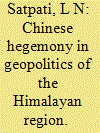

|
|
|
| 13 |
ID:
130285
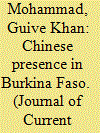

|
|
|
|
|
| Publication |
2014.
|
| Summary/Abstract |
Burkina Faso currently has no diplomatic relationship whatsoever with the People's Republic of China. Engaged in cooperation with Taiwan since 1994, it is one of only three African countries not a part of the Forum on China-Africa Cooperation. This unusual situation has produced a unique manifestation of the Chinese presence in Burkina Faso, where the estimated 600 Chinese migrants are primarily private entrepreneurs. This phenomenon of "globalization from below" - or, this migration of entrepreneurs that transcends the absence of diplomatic relations - creates new intimate social relations between the Burkinabe and Chinese people who come into contact with each other. Far from simply turning Chinese and Burkinabe into economic competitors, these relations have also led to the emergence of many forms of interpersonal and business cooperation. In this paper, I therefore demonstrate how Sino-African cooperation from below has developed in Burkina Faso, which stands in radical contrast to the latter's cooperation with Taiwan, which takes place almost exclusively on a broader state-to-state level. The empirical evidence of this study is drawn from field survey interviews and observations of both Chinese and Burkinabe entrepreneurs in Burkina Faso between 2010 and 2011.
|
|
|
|
|
|
|
|
|
|
|
|
|
|
|
|
| 14 |
ID:
130648


|
|
|
|
|
| Publication |
2013.
|
| Summary/Abstract |
The committee's report has highlighted the diversity of the countries of the Indian Ocean Rim and the multiple ways it which these states can be categorised. This diversity and the lack of a single agreed definition of the 'Indian Ocean Rim' has created a significant challenge for the development of policy, from both an Australian and a regional perspective. Australia's approach to trade in the Indian Ocean Rim is largely bilateral; defence and strategic relations are based on single issue groupings; and aid to the region is predominately provided under the auspices of the United Nations. Evidence gathered in relation to the Indian Ocean Rim Association for Regional Co-operation (IOR-ARC) demonstrates clearly that diversity in the region - both economic and political - has created inertia in the region's main organisation.
|
|
|
|
|
|
|
|
|
|
|
|
|
|
|
|
| 15 |
ID:
132307
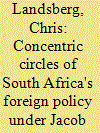

|
|
|
|
|
| Publication |
2014.
|
| Summary/Abstract |
South Africa's foreign policy could be viewed as a set of concentric circles which define the Republic's international priorities. In an attempt to bring coherence and predictability to them, the Zuma government has tried to learn from its predecessor, the Mbeki government (1999-2008), by putting emphasis on key international relations and concerns, and the idea was suggested that these different layers reinforced each other.
According to stated policy, pursuit of the national interests lay at the heart of the Republic's international strategies and came to be regarded as the new glue that holds it together, albeit it is four years into Zuma's government and the 'national interest' remains poorly developed and in need of expansion and implementation. A set of wider foreign policy concentric circles informs foreign policy, championed as 'Pursuing African Advancement and Enhanced Cooperation'. This agenda was to be pursued under a series of sub-goals or sub-categories, for our purposes concentric circles, namely (a) closing the gap between domestic and foreign policy; (b) continued prioritisation of the African continent-the Mbeki government called it African Agenda, or Africa first policy; (c) strengthening South-South relations; (d) strategic relations with strategic formations for the North; (e) participating in the global system of governance and (f) strengthening political and economic relations. While these six pillars were clearly developed on paper, and self-standing, how they all relate to the epicentre of the national interest and overlap one another is not so clear. More serious effort is needed on the part of government to close this lacuna, and the idea of coherence between them should not be assumed if there is to be consistency between them and the stated annulus of national interest.
|
|
|
|
|
|
|
|
|
|
|
|
|
|
|
|
| 16 |
ID:
135441
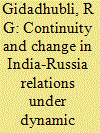

|
|
|
|
|
| Summary/Abstract |
Close and cordial political relations between India and Russia have sustained strategic partnership. Both the countries actively participate in regional organizations such as SCO, BRICS on issues of security, terrorism and economic cooperation. Russia’s ‘Look East’ policy has enabled China to overtake India in regional architecture. In changing global context, national interest plays dominant role in foreign policy calculations.
|
|
|
|
|
|
|
|
|
|
|
|
|
|
|
|
| 17 |
ID:
123719
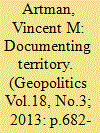

|
|
|
|
|
| Publication |
2013.
|
| Summary/Abstract |
Despite the crucial role it played in the 2008 war between Russia and Georgia, the phenomenon of passportisation has not received a great deal of scholarly attention. Much of the literature has treated the mass distribution of Russian passports to the residents of Abkhazia and South Ossetia as little more than a strategy to manufacture an excuse to go to war with Georgia. Drawing on recent scholarship on territory and territoriality, as well as with literature addressing Agamben's theories of exceptional spaces, this paper contributes to a more nuanced understanding of passportisation by analysing the territorial effects it produced. It argues that the wholesale conversion of Abkhazians and South Ossetians into Russian citizens did not merely manufacture a casus belli, it also produced exceptional spaces within the territory of the Republic of Georgia, where the norms of international law and the modern state system were effectively suspended.
|
|
|
|
|
|
|
|
|
|
|
|
|
|
|
|
| 18 |
ID:
181616
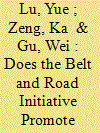

|
|
|
|
|
| Summary/Abstract |
This paper examines the role of the Belt and Road Initiative (BRI) in enhancing political relations between China and its partner countries. We postulate that an international economic cooperation scheme such as the BRI may facilitate commercial exchanges and increase the participating countries’ economic gains. This should generate incentives for these countries to avoid political tensions that may jeopardize mutually beneficial economic exchanges, and to expand the constellation of domestic coalitions in support of cordial diplomatic and political relations. We test the effect of the BRI on bilateral political relations using data on political relations between China and 91 countries along the BRI route between 2006 and 2018. Treating the promulgation of the BRI in 2013 as a policy shock, our difference-in-difference analysis lends substantial support to our hypotheses. Further analyses of the underlying causal mechanisms suggest that the BRI bolsters political relations by strengthening economic ties with partner countries through trade and investment related to economic cooperation.
|
|
|
|
|
|
|
|
|
|
|
|
|
|
|
|
| 19 |
ID:
128213
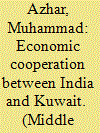

|
|
|
|
|
| Publication |
2014.
|
| Summary/Abstract |
Over two decades of liberalization and reforms have resulted in India becoming the second fastest growing economy in the world. Having the second largest population in the world, it is also a vast repository of skilled manpower. However, the significant growth in Indian economy has increased the demand for energy substantially. Consequently, India has to import 80 per cent of its petroleum crude requirement. In contrast to India, Kuwait is very small in size and population. But it is very rich in hydrocarbon resources. The economic cooperation between India and Kuwait is deep rooted. It consists of bilateral trade inclusive of energy imports, Indian expatriate workers in Kuwait and the inflow of remittances, Kuwaiti aid and prospective Kuwaiti investments. The article is a detailed study of all these aspects of economic cooperation between the two countries.
|
|
|
|
|
|
|
|
|
|
|
|
|
|
|
|
| 20 |
ID:
126629
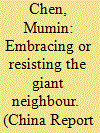

|
|
|
|
|
| Publication |
2013.
|
| Summary/Abstract |
Since 2008, President Ma Ying-jeou and his Kuomintang (KMT) government in Taiwan have adopted the policy of seeking greater economic cooperation with China in exchange of reducing confrontation across the Taiwan Strait. By endorsing the 'One China' principle, the KMT government successfully resumed dialogue with Beijing and signed 18 agreements, ranging from allowing Chinese tourists to visit Taiwan to establishing a closer economic partnership. Yet President Ma's self-claimed achievements in cross-strait peace received severe criticisms from the opposition Democratic Progressive Party (DPP), which accused KMT's pro-China policy as selling out the democratic Taiwan to an authoritarian regime. This article examines the on-going debates between the ruling KMT and opposition DPP about proper strategies towards China, and how such debates make it unlikely for Taiwan to form an effective policy on cross-strait affairs. The differences between KMT and DPP on their respective China policies have led to prolonged distrust between both parties, and between DPP and Beijing. Facing an increasingly powerful China, both parties are short of better ideas to convince voters that their current policy will effectively secure Taiwan's sovereign status or will be beneficial to enhancing Taiwan's interests in the long term.
|
|
|
|
|
|
|
|
|
|
|
|
|
|
|
|